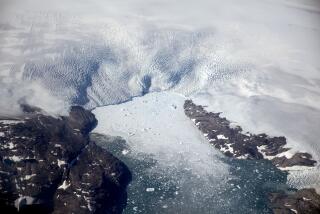Common plants, animals threatened by climate change, study says
WASHINGTON -- Climate change could lead to the widespread loss of common plants and animals around the world, according to a new study released Sunday in the journal Nature Climate Change.
The study’s authors looked at 50,000 common species. They found that more than half the plants and about a third of the animals could lose about 50% of their range by 2080 if the world continues its current course of rising greenhouse gas emissions.
Climate change affects the availability of nutrition and water for animals and plants. The narrowing of the geographic range of different common species means that plants and animals readily found in a given area could diminish markedly in those areas over the next seven decades.
“This study … tells us that the average plant and animal will experience significant range loss under climate change,” said the study’s lead author, Rachel Warren, of the Tyndall Centre at University of East Anglia, United Kingdom.
Warren said that until now, much climate change research had focused on the plight of rare species rather than common animals and plants. The study’s conclusions are “entirely consistent with what others are finding around the world,” said Peter B. Reich, professor of forest ecology at the University of Minnesota in St. Paul, who read the report.
The new study predicted that plants, reptiles and particularly amphibians would face the greatest risks from climate change. It also concluded that sub-Saharan Africa, Central America, the Amazon region and Australia would likely lose the most species of plants and animals. It projected “a major loss of plant species” in North Africa, Central Asia and South America.
A map of a species’ habitat can be thought of as a paint-by-numbers picture, Reich explained. If the species now occupies a certain number of spaces painted red, there will be fewer red spaces -- less habitable terrain -- 70 years from now, he said.
According to Jeff Price, a coauthor of the study and visiting fellow at the Tyndall Centre, “coffee, chocolate, teak, sugar maple, pineapple and cotton (at least some of the major types) all show large contractions in their climatic ranges under the baseline climate change scenario.”
The climactic range is the habitat where species not only exist but can thrive in numbers amid competitors.
Reich said that in Minnesota, it appears very likely that spruce, fir and aspen forests will retreat north into Canada over the next several decades as the state warms.
While the study looked at the effects of climate change on species’ geographic range, it made conservative estimates about how global warming could stoke diseases, pests or natural disasters that would affect species, Warren said.
Warren said, “Animals in particular may decline more as our predictions will be compounded by a loss of food from plants.”
The study concludes that such widespread losses could be avoided if the global community moved swiftly to reduce emissions of heat-trapping greenhouse gases that cause climate change.
Immediate, substantial steps could reduce species losses by 60 per cent and give plants and animals another 40 years to adapt, the study predicted. Slowing or cutting greenhouse gas emissions would help the Earth avoid the higher temperatures and subsequent habitat changes that could drive species loss, the study said.
Chances for averting higher temperatures, however, appear remote. On Friday, the National Oceanic and Atmospheric Administration reported that the ratio of carbon dioxide in the atmosphere has surpassed 400 parts per million in an average daily reading at Hawaii’s Mauna Loa Observatory, the highest concentration of the greenhouse gas in human history.
Climate scientists have calculated that the world needs to keep carbon dioxide emissions from crossing the 400 parts per million threshold in order to avoid a rise of 2 degrees Celsius (3.6 degrees F) above the average global temperature of pre-industrial times and profound changes to nearly every aspect of life, including species loss.
Twitter: @neelaeast
More to Read
Start your day right
Sign up for Essential California for news, features and recommendations from the L.A. Times and beyond in your inbox six days a week.
You may occasionally receive promotional content from the Los Angeles Times.







